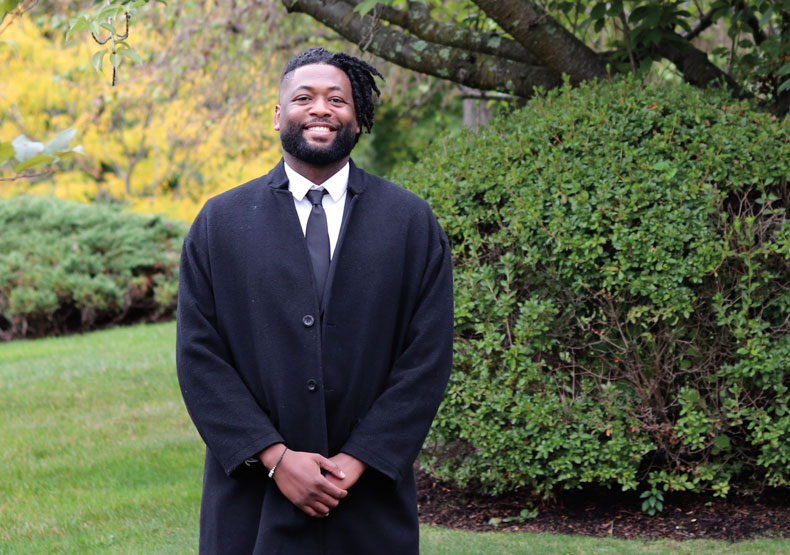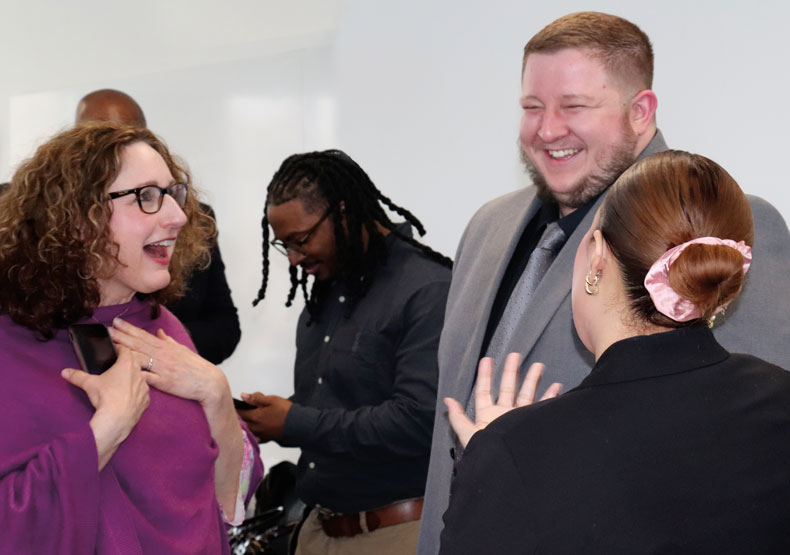Rung-by-Rung: Career Ladder Opportunities for Higher Education

Anthony Neptune, BS in Psychology and Human Services Alumnus and MA in Organizational Psychology Student.
Two Students Continue on to a Master’s in Organizational Psychology
One quarter of the way into the 21st century, William James College remains nimble amidst an ever-evolving societal landscape—one marked by busy professionals keen on building rewarding careers in the field of behavioral health and leadership. By offering a range of flexible online, blended, and part-time programs (many with scholarships and stipends), the College has created career ladder programs focused on expanding and diversifying the workforce. A broad range of programs now runs the gamut from gap-year service programs to bachelors, masters and doctoral degrees, offering entry points to higher education for learners at various stages of life.
Read on about two students who found a path to career success at William James College.
Anthony Neptune, a 2024 graduate of the BS in Psychology and Human Services program, hit what he calls an invisible wall after ten years spent working in human services. Despite professional strengths and skills gleaned along the way, he didn’t have a degree—which is why, when a professor at Massachusetts Bay Community College (where Neptune was pursuing his associate’s degree and working full time) pointed him toward William James College, he took notice.
“I really wanted to stretch myself [academically], to become detail oriented,” says Neptune, who was accepted to a handful of schools in the Boston area. The specific focus on psychology at William James College, coupled with a reputation for being accessible to working professionals, ultimately tipped the scales for Neptune.
“I had heard that the professors really cared about making sure the learning experience was thoughtful, [taking into consideration] the needs of the individual student [while striving] for that engagement to be unique,” says Neptune who is raising a young family while working full time and consulting with executive leaders in the nonprofit and for-profit sectors at Neptune Coaching, which he founded in 2020.
Neptune cites a strong connection with mentors—including Joan Axelrod, Dr. Kerri Augusto, and Dr. Miranda Lane—as strengthening his experience at William James College.
“There was a sense of purpose, always, about why the work mattered to me as an individual, and how it connected to my future goals,” says Neptune who has decided to embark on the next rung of his career ladder: pursuing graduate studies in Organizational Psychology at William James College in order to combine his real-world experience with research-based frameworks.
“The rigor, expectation for excellence, and flexibility [at William James College] have challenged me to think critically and given me the confidence to achieve what I want through higher ed.”
A Path Through the Behavioral Health Service Corps

Ryan Duquette (right), with Suzanne Devlin, PhD, (left) Organizational and Leadership Psychology Department Chair.
After earning a bachelor’s degree in business management (rather than pursuing his passion for psychology), Ryan Duquette vowed never to return to academia. Not surprisingly, the Behavioral Health Service Corp (BHSC) graduate and current Master of Arts candidate in Organizational Psychology hardly envisioned his professional path unfolding as it has—until becoming a parent and finding his way to William James College.
“Having the flexibility to complete my education online was vital,” says Duquette, a resident of Rhode Island, whose lived experience with mental health challenges sparked the way forward. He was working as a peer specialist supervisor at the Worcester Recovery Center and Hospital—occupying a “really vulnerable space” with clients—when he first learned about the educational and career opportunities available through the College.
A degree from Westfield State University coupled with experience working with underserved populations in the behavioral health field made Duquette an excellent candidate for the paid, year-long service and learning opportunity for college graduates via BHSC. When things got rocky, following the premature birth of his son, Duquette considered dropping everything—until unconditional support from faculty and staff (plus a promise to figure things out, no matter what that entailed) convinced him to stay.
“At WJC, I have found a community of people where I feel like I belong—where my personality fits and my interests click—something I never really thought I would find through education.”
- Tags:
- Around Campus
Topics/Tags
Follow William James College
Media Contact
- Katie O'Hare
- Senior Director of Marketing
- katie_ohare@williamjames.edu
- 617-564-9389
